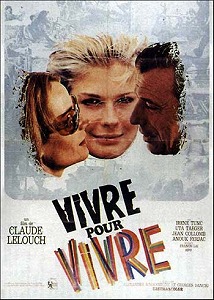| Live for Life (Vivre pour vivre) | |
|---|---|
 original film poster | |
| Directed by | Claude Lelouch |
| Written by |
|
| Produced by |
|
| Starring | |
| Cinematography | Patrice Pouget |
| Edited by | Claude Barrois Claude Lelouch |
| Music by | Francis Lai |
| Distributed by | United Artists |
Release date |
|
Running time | 130 minutes |
| Country | France |
| Language | French |
| Box office | $400,000 (US) [1] |
Live for Life (French : Vivre pour vivre) is a 1967 French film directed by Claude Lelouch starring Yves Montand, Candice Bergen and Annie Girardot. The film won the Golden Globe for Best Foreign Language Film and was nominated for the Academy Award for Best Foreign Language Film. [2] The film had a total of 2,936,035 admissions in France and was the 7th highest-grossing film of the year. [3]